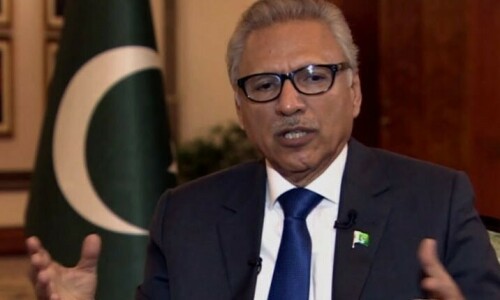ISLAMABAD: In a unilateral decision that may pitch the provinces against the Centre, Prime Minister Shehbaz Sharif has appointed a former federal secretary as chairman of the Indus River System Authority (Irsa), on top of the five-member water regulator nominated by the four provinces and the federal government.
The decision, which virtually supersedes the incumbent chairman — Abdul Hameed Mengal from Balochistan — is also likely to create a rift between the ruling PML-N and President Asif Ali Zardari’s PPP, as the new structure apparently compromises the regulator’s independent status.
“The prime minister… is pleased to appoint Mr Zafar Mahmood, a retired BS-22 Federal Government officer… as chairman Indus River System Authority (Irsa),” said an order issued by PM’s Secretary Asad Rehman Gilani.
The Ministry of Water Resources will now formally issue a notification to this effect.
Move likely to trigger row between Centre, provinces; PPP leader claims Zardari has not seen or signed the ordinance
Mr Mahmood’s induction has been made under the controversial Irsa Amendment Ordinance 2024 that was returned with reservations by then-president Arif Alvi to then-caretaker PM Anwaarul Haq Kakar. What transpired after that remains a mystery.
An official from the Ministry of Water Resources said the president had returned the draft ordinance, but it was only known to the Presidency and the PM Office whether the president had rejected the ordinance or suggested a revisit. He said Article 48 of the Constitution provided for the premier (in this case Mr Kakar) to resend the draft, which would have become law on completion of subsequent 10 days.
“What we know for sure is that the Irsa Amendment Ordinance 2024 has now been printed [in the gazette of Pakistan] and will be placed before parliament to become a permanent act, because the ordinance obviously has a limited shelf life,” he explained.
Sindh rejects move
“This is not only questionable in the eyes of constitutional provisions but also has ramifications for the federation,” cautioned a PPP leader, adding that the Sindh government had already rejected the move being ‘illegal’ and against the Irsa Act.
He claimed that President Zardari had neither seen nor signed the purported ordinance.
The ordinance, seen by Dawn, apparently neutralises the powers of the incumbent Irsa and has not gone through the mandatory clearance of the Council of Common Interests (CCI).
It dilutes the collective powers of Irsa, comprising four provincial and a federal member. Now, the provinces would not be given the position of Irsa chairman.
At present, the post of chairman is rotated among the provinces and the centre on an annual basis in the alphabetical order. This rotational representation would now be for the newly created position of vice chairman who would work under the directly appointed chairman.
The new law gives overwhelming powers to the chairman. He will be in the driving seat with the help of his own team of “independent consultants and experts” in critical decision making relating to the irrigation system, provincial water shares and financial autonomy to impose charges, fee or cess etc.
In the absence of chairman, these powers would stand transferred to another federal government official, replacing the current position of the chief engineering adviser/chairman federal flood commission (CEA/CFCC) who has to perform responsibilities of the chairman or federal member Irsa.
Irsa could co-opt other members as well, but on the recommendation of the chairman, who would “be an employee of the federal government, either serving or retired in BPS-21 or higher” and on such terms and conditions as may be determined by the PM.
The law prevents the provinces from approaching the CCI if they are aggrieved by any decision of Irsa and instead requires a review to be filed before the Irsa chairman, who would decide the matter through speaking orders, with the help of an “Independent Expert Committee” appointed by himself.
The chairman alone will be empowered to request the federal government to provide adequate security “through the Armed Forces of Pakistan or other law enforcement agencies” for protection of any location or installation.
A new clause has been proposed giving massive powers to the chairman. It reads, “The authority shall have its own secretariat and such other offices, consisting of officers, employees or consultants, as the Chairman may, from time to time, deem necessary for discharging the functions envisioned under this act”.
The chairman will also hire two experts of hydrology, hydraulic modelling or related engineering, two experts of remote sensing, GIS, irrigation or related engineering and four experts of other related fields to advise on various matters.
Published in Dawn, March 14th, 2024













































Dear visitor, the comments section is undergoing an overhaul and will return soon.